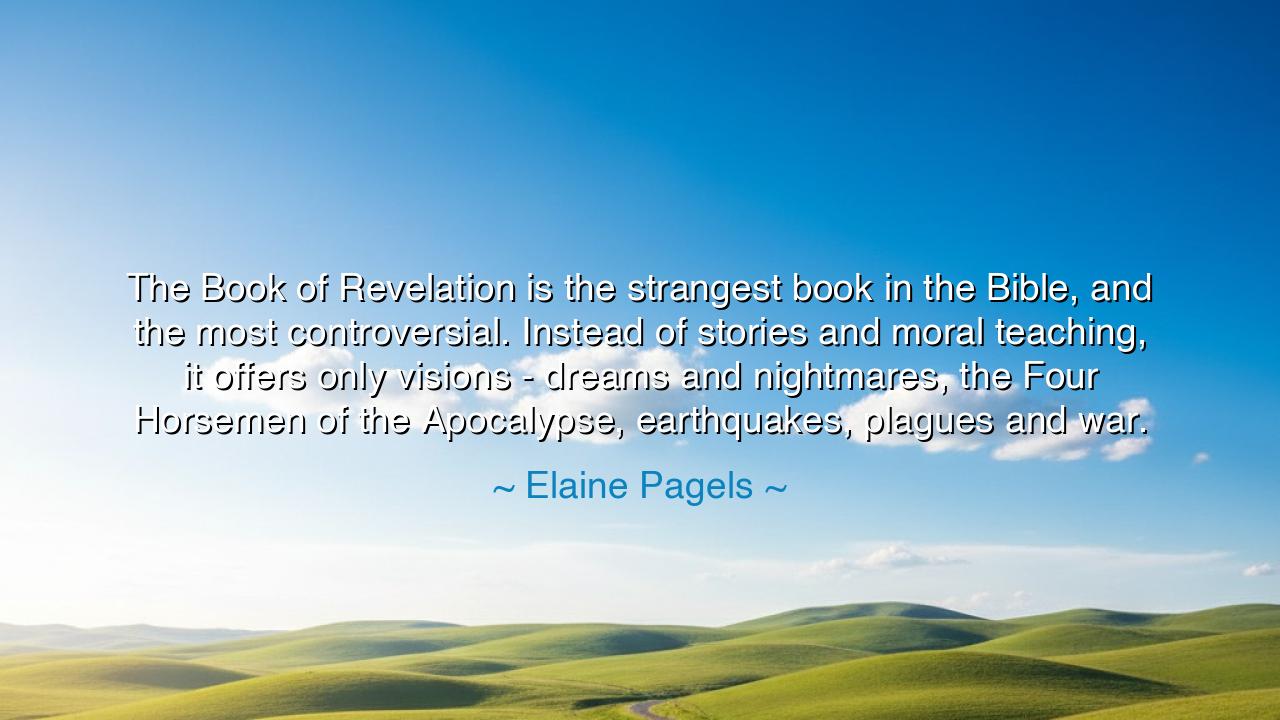
The Book of Revelation is the strangest book in the Bible, and
The Book of Revelation is the strangest book in the Bible, and the most controversial. Instead of stories and moral teaching, it offers only visions - dreams and nightmares, the Four Horsemen of the Apocalypse, earthquakes, plagues and war.






In the vast expanse of human experience, few books have stirred as much debate, as many visions, and as much mysticism as the Book of Revelation. Elaine Pagels captures its essence when she writes, “The Book of Revelation is the strangest book in the Bible, and the most controversial. Instead of stories and moral teaching, it offers only visions – dreams and nightmares, the Four Horsemen of the Apocalypse, earthquakes, plagues, and war.” The Revelation of John, unlike other books in the Bible that recount stories of faith, morality, and redemption, offers instead a series of visions so vivid and unsettling that they have become the subject of endless interpretation and speculation. In these images of the end of times, we find not only a glimpse of the world’s destruction but a reflection of the deepest fears and hopes of humanity.
The ancient world was no stranger to visions and prophecies. The Oracle of Delphi, speaking through the priestess Pythia, offered cryptic messages that were often interpreted as foretelling either doom or salvation. Similarly, visions in the Old Testament, such as those seen by Daniel or Ezekiel, portrayed grand images of divine judgment and the coming kingdom of God. The Book of Revelation, however, is distinct. John’s visions are not of a distant future already shaped by history, but of a future unfolding, a series of catastrophic events that could strike at any moment. These are not neatly wrapped teachings but wild, unsettling glimpses of destruction—earthquakes, plagues, and the Four Horsemen—symbols that blur the line between dream and nightmare. In these visions, the future is not a place of clarity but a land of chaos, ruled by forces beyond human comprehension.
To understand Revelation is to confront the fear and chaos that has always lived in the human spirit. Consider the tale of the Black Death, which swept across Europe in the 14th century, killing millions. It was not just a plague, but a nightmare, a vision of the end of the world for the people who lived through it. In the midst of this catastrophe, many saw the Four Horsemen riding through the streets, bearing death, pestilence, and famine. Just as John’s vision described the horrors of the Apocalypse, so did those who lived through the Black Death feel the reality of these images in their daily lives. The plague was their Revelation, a terrifying vision of human fragility, yet it was also a call to action—a summons to reclaim the soul from despair and find meaning even in the face of utter destruction.
The apocalyptic visions of Revelation were not merely predictions of doom, but also a warning—a reminder that the actions of humanity today shape the fate of tomorrow. Moses, in leading the Exodus, faced a world full of uncertainty and fear, yet his faith in the promise of deliverance was unwavering. Similarly, John’s visions are not just about the destruction of the world, but about the promise of renewal that follows. Revelation speaks to humanity’s deepest fears, yes, but it also holds out a vision of hope—the new heaven, the new earth, where justice reigns and peace is restored. The visions of the Apocalypse are not only for the end of days, but for the ways we live today, shaping the world around us with every choice, every action, every belief.
Pagels' reflection on Revelation emphasizes its role as a book of visions rather than clear moral lessons. Unlike the teachings of Jesus or the wisdom found in the Proverbs, Revelation is a flood of images and emotions that call the reader to reflect on the nature of time, the presence of evil, and the struggle between light and darkness. Just as the ancient Greek tragedies unfolded a story not just for entertainment, but for profound moral reflection, so does Revelation challenge its readers to confront the profound mystery of existence. It forces us to ask, "What happens when everything is shaken? What do we hold on to in the face of chaos?"
The lesson from Revelation, and from the contemplation of its strange and disturbing visions, is one of awareness—awareness that the world is not always as we wish it to be, and that the future is not assured. It is also a lesson about resilience, the ability to continue moving forward even in the face of disaster, and the courage to confront the uncertainty of our times. In our own lives, we too face visions of crisis, whether in the form of personal struggles or global challenges. The moral is not to succumb to despair, but to remain rooted in our faith in hope, and to find meaning and purpose even when the world seems to be in turmoil.
Therefore, the call to action is clear: do not shy away from the visions of your own life, even if they are full of fear or uncertainty. Just as Revelation teaches us to face the end of things, we must also embrace the possibility of rebirth and renewal. Whatever nightmares we encounter, whether in our personal lives or in the world around us, we must continue to reach for the light—knowing that each challenge holds within it the seed of transformation. Let the visions of the future pull you forward, not as a cause for fear, but as an invitation to rebuild, renew, and reclaim your destiny.






AAdministratorAdministrator
Welcome, honored guests. Please leave a comment, we will respond soon